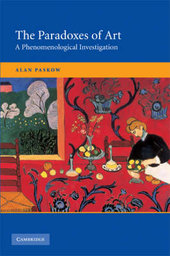
|
The Paradoxes of Art: A Phenomenological Investigation
Paperback / softback
Main Details
| Title |
The Paradoxes of Art: A Phenomenological Investigation
|
| Authors and Contributors |
By (author) Alan Paskow
|
| Physical Properties |
| Format:Paperback / softback | | Pages:272 | | Dimensions(mm): Height 218,Width 151 |
|
| Category/Genre | Theory of art |
|---|
| ISBN/Barcode |
9780521733182
|
| Classifications | Dewey:111.85 |
|---|
| Audience | | Tertiary Education (US: College) | |
|---|
| Illustrations |
8 Plates, color
|
|
Publishing Details |
| Publisher |
Cambridge University Press
|
| Imprint |
Cambridge University Press
|
| Publication Date |
7 July 2008 |
| Publication Country |
United Kingdom
|
Description
In this study, Alan Paskow first asks why fictional characters, such as Hamlet and Anna Karenina, matter to us and how they emotionally affect us. He then applies these questions to painting, demonstrating that certain paintings beckon us to view their contents as real. As emblematic of the fundamental concerns of our lives, paintings, he argues, are not simply in our heads but in our world. Paskow also situates the phenomenological approach to the experience of painting in relation to contemporary schools of thought, particularly Marxist, feminist, and deconstructionist.
Author Biography
Alan Paskow is professor of philosophy at St. Mary's College of Maryland.
Reviews"By the unique application of the phenomenological notion of being-in-the-world, he is able to expand and clarify people's understanding of the situations in which transactions with art take place, thus shedding light on questions of interpretation, artistic ambiguity, aesthetic attitude, and the definition of artworks." -R.M. Davis, Albion College, Choice "Paskow's book is lucid and well written...the book remains an important contribution to the literature on our engagement with art." Sarah Worth, Furman University, Notre Dame Philosophical Review "...Paskow aims to establish the 'ontological status of fictional beings' and pursue the bold and ambitious claim that fictional beings are 'quasi-real.' Mindful of the fact that many readers will be skeptical of such a position, he carefully rehearses the relevant problems in analytic philosophy before unfolding the challenge his undertaking presents. He does this in an altogether engaging and lucid prose that not only makes the book accessible to readers unfamiliar with its debate but also provides scholars with a precision often lacking in such writing." Michael Belshaw, Loughborough University, The Journal of Aesthetics and Art Criticism "This, I believe, is a significant contribution, not just to the debate about why art matters to us but also to the wider question of how we consciously inhabit the world...[The Paradoxes of Art] is of particular relevance given that the discourses of art, philosophy, and consciousness are rapidly converging..." Robert Pepperell, Leonardo On-line
|